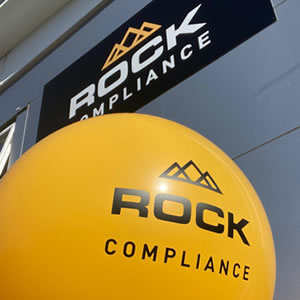HOW CAN WE HELP?
For an informal chat on how we can work with you,
please complete this form and we will be in touch.
To make clear the position of Rock Compliance Limited (referred to as “the Company”) with regard to acts of bribery and corruption, including the Company’s rules on the giving and receiving of gifts and corporate hospitality, and to outline processes and procedures that aim to prevent these acts from occurring.
This policy document outlines specific procedures that apply to all employees, regardless of seniority (including directors), employed within businesses within the Company, regardless of whether they are permanent, fixed term or temporary. It also includes consultants, contractors, trainees, agency workers, interns, home workers, casual workers, agents, sponsors, volunteers and any other person associated with the Company or any of its businesses (collectively referred to as “relevant individuals”).
The policies and procedures within this document will also apply to any overseas business units of the Company, as its operations remain within the jurisdiction of The Bribery Act 2010. For the avoidance of doubt – this policy and procedure does not form part of an employee’s contract of employment and the Company may amend or withdraw the policy and procedure from time to time.
The board and directors of the Company strongly believe in the following:
If any employees are found to be breaching the anti-bribery policies, the disciplinary procedure will be invoked and the situation will be dealt with very seriously. Bribery is a criminal offence, and one that could expose the Company and its employees to prosecution as well as doing damage to its reputation. The Company is, therefore, committed to preventing bribery and corruption as well as developing a culture in which acts of bribery and corruption are not tolerated.
The line between accepting gifts, given freely and unconditionally, and accepting them in order to influence a business decision may be very thin. This policy aims to distinguish between the two in order that employees clearly understand what is or is not acceptable. It is important to note that the Bribery Act does not prohibit normal genuine hospitality, promotional activities or other expenditure, which purports to improve a business standing with respect to image, products and services or relations.
Anti-bribery clauses must be included in all Statements of Employment Particulars (including Service Contracts) and must make clear the following points:
It is the responsibility of the management of the Company to identify vulnerable areas of the business that may potentially be ‘at risk’ to bribery and corruption. This should be completed by using the Risk Assessment provided on an annual basis. Vulnerable areas include the following:
Individuals identified as ‘at risk’ will be given additional training on how to tackle situations where bribery occurs.
Businesses should be extra vigilant when operating in different parts of the world, especially those highlighted in the corruption perceptions index. During a new business acquisition, the due diligence involved must include items relating to anti-bribery. These items can be found in section 6. Procedures relating to gifts and corporate hospitality can be found in sections 10 and 11.
Due diligence of any third party (subcontractors, joint ventures, acquisitions, agents) should now include comment on and review the following items relating to bribery and corruption:
In addition, potential identification of risk areas should be reported and an appropriate Action Plan, developed through due diligence.
Key decision makers should be identified as ‘at risk’ in order to determine where potential acts of bribery and corruption may occur. When submitting tenders, any third-party supplier must be able to demonstrate that it can comply with an equivalent level of care in relation to anti-bribery. Where this is not operationally possible due to high volume and reactive work, a preferred supplier list should be maintained with the relevant checks having been sought prior to acceptance on the list.
Individuals involved in a tender process must not under any circumstances offer or accept any gifts from existing suppliers, contractors or potential business partners during any kind of active bidding, procurement or negotiation process. Sub-contractor risk assessments must include a review of any anti-bribery procedures.
The Company does not make, and will not accept, facilitation payments or ‘kickbacks’ of any kind. Facilitation payments are typically small, unofficial payments made to secure or expedite a routine action by a public sector 5 official/customer official. They are not commonly paid in the UK but are common in some other jurisdictions. If employees are asked to make a payment on behalf of the relevant business, they should always be mindful of what the payment is for and whether the amount requested is proportionate to the goods or services provided. Employees should always ask for a receipt, which details the reason for the payment.
If employees have any suspicions, concerns or queries regarding a payment, they should raise these with their manager or a relevant director. Kickbacks are typically payments made in return for a business favour or advantage. All relevant individuals must avoid any activity that might lead to, or suggest, that a facilitation payment or kickback will be made or accepted by the Company.
The Company does not make contributions to political parties. Charitable donations are only made if they are legal and ethical under local laws and practices. No donation must be offered or made without the prior approval of a director.
Approval from an employee’s manager is generally required before offering or accepting any gifts. Please note – approval will not be required for small promotional items such as pens, mugs or mouse mats. Equally, approval will not be needed to buy someone low value items such as a drink and a sandwich or a breakfast. Managers should use the following guidelines to help decide what can and cannot be offered and accepted:
Offering gifts
There may be certain circumstances where it is appropriate to offer business partners token, non-cash gifts as a gesture of good will. Such circumstances might include when a service has been carried out to an extremely high standard, or when at the completion of a long and successful business partnership. Employees must never offer, under any circumstance:
Accepting gifts
The Company deems it appropriate for employees to accept token gifts from current or potential business partners where this constitutes a legitimate and reasonable goodwill gesture. Employees must never accept:
Accepting gifts over the value of £50 requires the approval of the employee’s manager. The gift to be accepted must then be recorded on the Gifts and Hospitality Register held at each business. Offering gifts over the value of £50, also requires the prior approval of the employee’s manager. The gift to be offered must then be recorded on the Gifts and Hospitality Register held at each business.
The Company recognises that in some parts of the world, giving and receiving gifts is traditional and part of local culture. In these circumstances, such gifts may be accepted, if this is in proportion with the business relationship, but must subsequently be donated to charity.
Employees may participate in corporate hospitality and entertainment where this will help promote positive business relationships. The scale and expense of such hospitality or entertainment, however, should be reasonable and in proportion with the business value of the relationship. Hospitality and entertainment arrangements should never be offered or accepted if:
Accepting hospitality/entertainment over the value of £250 per employee or over £1,000 for an entire event, requires the prior approval of the employee’s manager. The hospitality/entertainment arrangement must then be recorded on the Gifts and Hospitality Register held at each business. Offering hospitality/entertainment over the value of £250 per employee or over £1,000 for an entire event requires the prior approval of the employee’s manager. The hospitality/entertainment arrangement must then be recorded on the Gifts and Hospitality Register held at each business.
Any employee that is offered, or wants to offer, an invitation that they consider to be acceptable within this policy must first gain the approval of their manager. Please note – representatives from group finance and a member of the HR team can be consulted on the appropriateness of a hospitality event.
Gifts and hospitality arrangements over the limits outlined in sections 10 and 11, whether offered or accepted, must be recorded via the employee’s manager, on to the Gifts and Hospitality Register. Failure to disclose any gift or hospitality may constitute a disciplinary offence and as such will be handled under the Company’s disciplinary procedure.
Where gifts or hospitality arrangements of a significant value are not recorded and, for example, the recipient is in a position to influence business dealings with the donor, the offence may be treated as gross misconduct.
Financial records must be kept and businesses must have appropriate internal controls in place that will evidence the business reason for making payments to third parties. All accounts, invoices, memoranda and other documents and records relating to dealings with third parties, such as clients, suppliers and business contacts, should be prepared and maintained with strict accuracy and completeness. No accounts must be kept ‘off-book’ to facilitate or conceal improper payments.
Business gifts are exempt from tax, provided they meet all the following criteria:
Alternatively, if the gift is in the form of money, vouchers or securities that can be exchanged or converted into money, the gift becomes taxable. Similarly, corporate hospitality and entertainment, when provided by a genuine third party, is not subject to tax.
In order to manage the risk of corruption within the business, the following processes are in place:
All employees and associated persons throughout the Company will be made aware of this policy document through announcements, individual letters and briefings as well as via the intranet. In addition to the procedures outlined in this policy document, all directors and senior managers, as well as those individuals identified as ‘at risk’, will be given additional training on the implications of The Bribery Act 2010, as well as how to tackle situations where bribery occurs.
For employees
If an inappropriate offer is made to an employee, they should:
If the inappropriate offer is reiterated to an employee, they should:
If an employee is suspicious of bribery or corruption within the Company, they are encouraged to report such matters in accordance with the Whistle Blowing Policy, available on the Intranet.
All those persons referred to within the scope of this policy are required to adhere to its terms and conditions. Any employee who breaches this policy may face disciplinary action, which could result in dismissal for gross misconduct. Individual managers are responsible for ensuring that this policy is applied within their own area.
Any queries on the application or interpretation of this policy must be discussed with the HR team prior to any action being taken. The HR director has the responsibility for ensuring the maintenance, regular review and updating of this policy. Revisions, amendments or alterations to the policy can only be implemented following consideration and approval by the HR director. This policy will be reviewed and, if necessary, updated on an annual basis.

Customer Case Studies
DOWNLOAD
For an informal chat on how we can work with you,
please complete this form and we will be in touch.
























